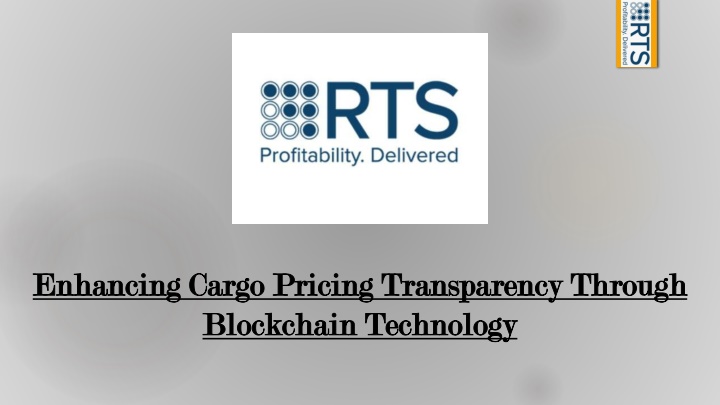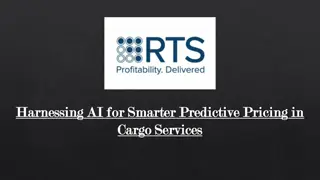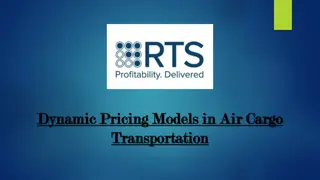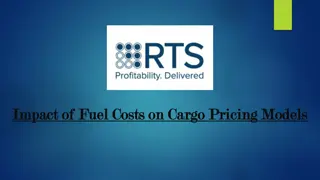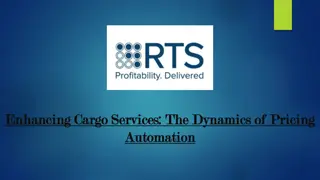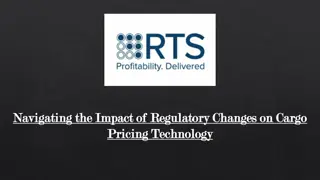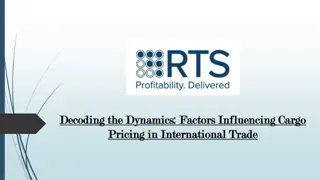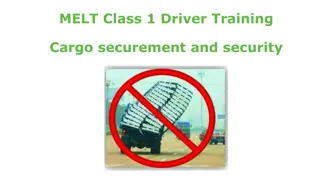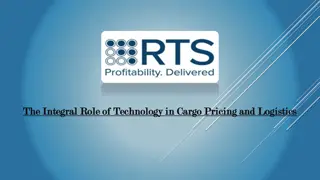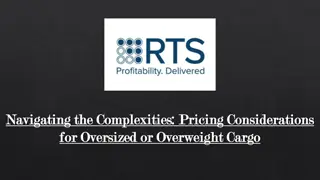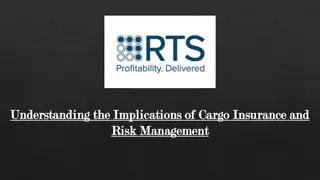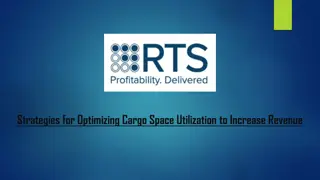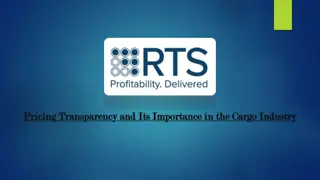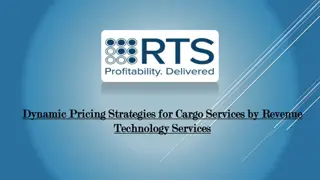Enhancing Cargo Pricing Transparency Through Blockchain Technology
In the intricate and fast-paced world of logistics and cargo management, maintaining clarity on pricing has always been a critical challenge. With the advent of blockchain technology, companies are now envisioning a more transparent and efficient system for handling cargo pricing. Revenue Technology Services (RTS) is at the forefront of this innovation, leveraging blockchain to transform how dynamic pricing strategies are implemented and communicated in the cargo industry.n
Download Presentation

Please find below an Image/Link to download the presentation.
The content on the website is provided AS IS for your information and personal use only. It may not be sold, licensed, or shared on other websites without obtaining consent from the author.If you encounter any issues during the download, it is possible that the publisher has removed the file from their server.
You are allowed to download the files provided on this website for personal or commercial use, subject to the condition that they are used lawfully. All files are the property of their respective owners.
The content on the website is provided AS IS for your information and personal use only. It may not be sold, licensed, or shared on other websites without obtaining consent from the author.
E N D
Presentation Transcript
Enhancing Cargo Pricing Transparency Through Enhancing Cargo Pricing Transparency Through Blockchain Blockchain Technology Technology
In the intricate and fast-paced world of logistics and cargo management, maintaining clarity on pricing has always been a critical challenge. With the advent of blockchain technology, companies are now envisioning a more transparent and efficient system for handling cargo pricing. Revenue Technology Services (RTS) is at the forefront of this innovation, leveraging blockchain to transform how dynamic pricing strategies are implemented and communicated in the cargo industry. Cargo pricing, the method of determining the cost associated with transporting goods, can be influenced by numerous factors including demand, capacity, fuel costs, and market competition. Dynamic pricing, a strategy that adjusts prices in real-time based on these variables, has become increasingly popular. However, it also introduces a level of complexity and opacity that can lead to distrust among shippers. Blockchain technology offers a promising solution to these challenges.
Blockchain, at its core, is a decentralized ledger that records all transactions across a network of computers. This technology ensures that once a transaction is recorded, it cannot be altered without the consensus of the network, thereby offering an unprecedented level of data integrity and security. For cargo pricing, blockchain can serve as a transparent, immutable repository of all pricing decisions and the rationale behind them. For instance, RTS is utilizing blockchain to record and share information on how certain pricing decisions are made in real-time. This could include data on capacity utilization, fuel costs, and other logistic expenses, which influence dynamic pricing. By making this data accessible to all stakeholders in a secure and immutable manner, blockchain enhances transparency and builds trust among shippers, carriers, and freight forwarders. Moreover, blockchain facilitates better coordination among different parties involved in the logistics chain. By having access to the same information, all parties can see the fair pricing mechanisms at play, reducing disputes and enhancing collaboration. This shared visibility helps in predicting and managing demand more effectively, allowing cargo companies to adjust their dynamic pricing models with greater accuracy and fairness.
Another significant advantage of using blockchain in cargo pricing is the potential reduction in administrative overheads. Traditional methods of recording and sharing pricing data are often cumbersome and prone to errors. Blockchain automates these processes and eliminates redundancies, which not only speeds up operations but also reduces the likelihood of costly errors. The implementation of blockchain by RTS not only promises to revolutionize cargo pricing by making it more transparent but also aligns with broader trends in the logistics industry towards digitization and automation. As blockchain technology matures and more companies adopt it, we can expect to see a significant shift in how cargo pricing is approached globally.
In conclusion, blockchain technology presents a transformative opportunity for the cargo industry. By embedding transparency into dynamic pricing strategies, it not only fosters trust among all parties involved but also enhances operational efficiencies. Companies like Revenue Technology Services are leading this change, pioneering a future where cargo pricing is not just dynamic but decisively more transparent and equitable for everyone in the logistics ecosystem.
THANK YOU THANK YOU
